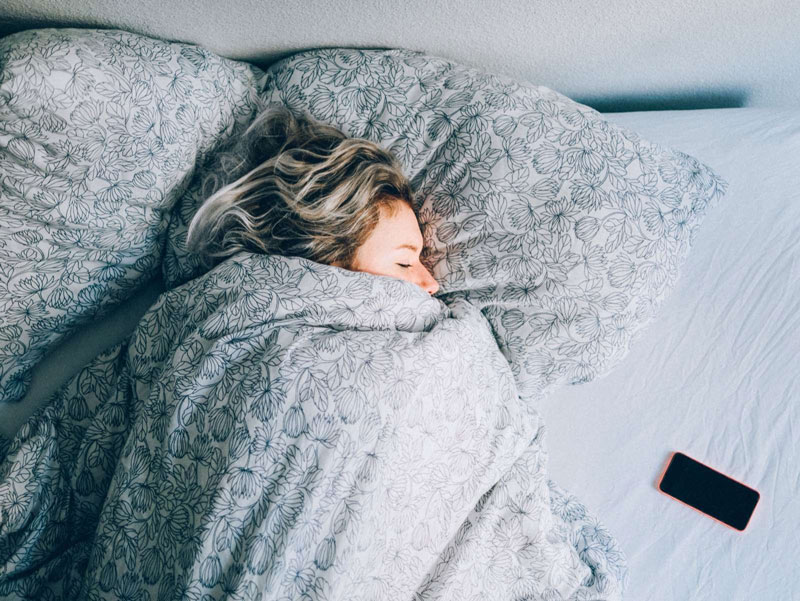
Last updated:
Research shows a lack of sleep can put people off wanting to hang out with us, leaving us feeling lonely and isolated as a result1.
If you’re reading this you might be trying to calculate how many hours of shut-eye you got in last night, and if you’re like 7.4 million Australians whose total is under eight2, you may be feeling the effects of sleep deprivation.
Consequences of poor sleep
The effects of sleep deprivation go way beyond being a little tired – and they can be surprising. Extended periods of bad sleep have been shown to lead to an increase in risky behaviour
3, and chronic sleep deprivation has been linked to an increased chance of developing serious health issues including obesity, heart disease, and high blood pressure.
While a weekend sleep-in certainly sounds appealing, establishing a regular sleeping schedule is far better for you in the long-term.
So, how can you ensure you’re consistently getting a decent rest in?
Switch off – mentally and digitally
Unplugging altogether is your best bet for a better night’s sleep. The blue light that radiates from your smart device’s screen can trick the brain into thinking it’s daytime, inhibiting the production of melatonin – the hormone that helps to regulate sleep.
If getting off-grid isn’t an option, most devices come with a night shift mode, which disables the blue light. It gradually adjusts your screen to display warmer colours when it gets dark and can help to make drifting off easier.
Another option is to invest in blue-light lenses for your spectacles. Designed to filter out blue light, many manufacturers now offer these lenses across a range of frame styles.
Also, think about the content you’re consuming before bed. Videos can stimulate the brain no end, and even relaxing activities like reading can disrupt sleep patterns if done on a screen.
Establish good sleep hygiene
Just like other parts of your life, ritual is important to your rest. ‘Sleep hygiene’ refers to your pre-bedtime routine and, just like physical hygiene, it’s something you need to maintain. Bad habits can become ingrained in your daily life, and they can have a serious impact on the length and quality of your sleep.
Regular exercise has been shown to strengthen your body’s natural circadian rhythm4, meaning that hitting the gym can lead to you feeling sharp during the day and ready for bed in the evening.
On the flipside, try to avoid mentally stimulating activities like watching TV at least one hour prior to sleep and do your best to hit the hay at the same time each night. Establishing a set routine will teach your body to anticipate sleep, and you’ll find yourself getting drowsy in the evening.
Finally, designate your bedroom as a space specifically for sleeping. If you spend time hanging out and eating in your room, you’re subconsciously training your brain to link the space with those activities – which will make it harder to sleep.
Investigate your sleep
Obstructive sleep apnoea is a medical condition that affects five per cent of Australians, robbing them of a good night's sleep. If you are battling with daytime fatigue, poor concentration, tiredness and snoring, you can investigate what's going on by conducting a sleep study.
Pharmacy 777 conducts free consultations and an at home sleep study that can help you find out if you’ve got obstructive sleep apnoea.
You can conduct this test in the comfort of your own home, with data then assessed by a sleep physician to determine if further management is required.
Pharmacy 777 pharmacists can also provide lifestyle advice and ongoing, personalised support for general sleep issues.
Make sure you're at the right temperature
Changes in your core body temperature are linked with achieving quality rest5. Cooling the body helps to initiate sleep, and a temperature between 16–19 degrees is the sweet spot for nodding off.
If your bedroom is consistently too warm to sleep comfortably in, try stripping back the covers and sleeping with your hands and feet outside of them (you lose heat quickest from your extremities).
Avoid sleeping with heaters on, and don’t pile on the blankets. Finally, consider upgrading your mattress, as a good-quality one will be designed to reduce body heat quickly and effectively.
Bronze Hospital Plus
Budget-friendly hospital cover that includes cover for the investigation of sleep patterns and sleep anomalies. For example, sleep apnoea and snoring.
Find out more
Was this information helpful?
Your feedback is appreciated and helps us
provide more useful, relevant content.
We've received your response,
thanks for letting us know.
Sources:
- 1 The Guardian - Feeling lonely? Why a good night’s sleep might be the ultimate cure (2018)
- 2 News.com.au - New report shows inadequate sleep is costing the country $66.3 billion (2017)
- 3 Wiley - Insufficient sleep: Enhanced risk‐seeking relates to low local sleep intensity (2017)
- 4 Psychology Today - Better Sleep Found by Exercising on a Regular Basis (2013)
- 5 Sleep.org - The Ideal Temperature for Sleep (2021)